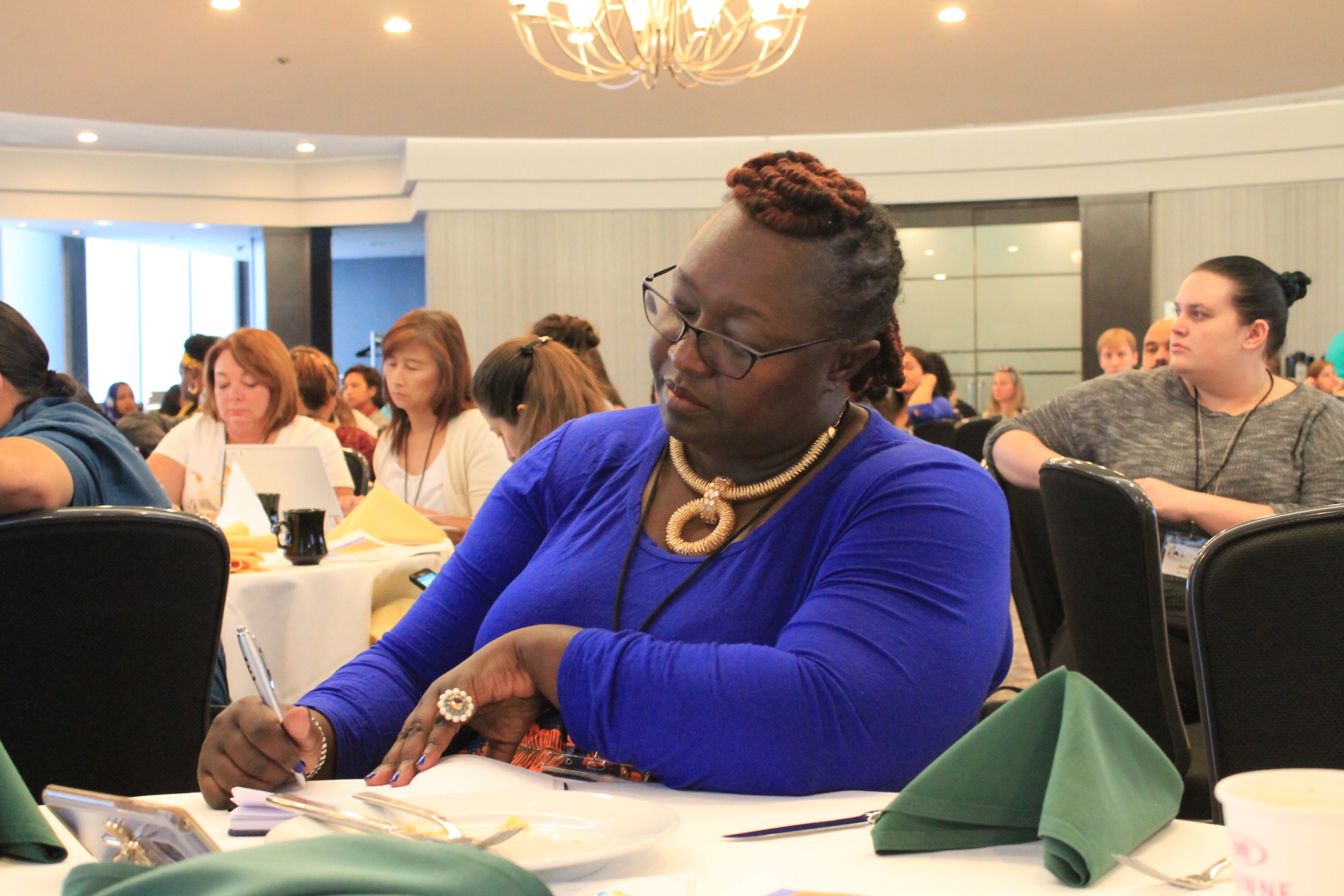
Anita Koyier-Mwamba at the 2018 Family Engagement Institute.
Early this year I was privileged to share my thoughts about family engagement and my journey into the profession. Since then, there have been so many dramatic, unexpected changes in all our lives as we navigate our paths through a tri pandemic of COVID-19, the economy and racism and face the ongoing turbulent consequences of environmental distress caused by climate change. These changes are impacting how we parent and how we work.
In my previous post I said my role as a parent is to make sure my children learn, develop a work ethic and know how to advocate for themselves in the face of educational injustice. Never has this statement been truer than now. Schools have come into our homes. For students who experience school as a hostile space, this invasion into their homes robs them of their solace. Yet, we persist in attempting to translate school in its brick and mortar form to the home. We need to innovate not just with technology, but with pedagogy, assessments, and administration. Part of this innovation requires we recognize (in both theory and practice) the role of parents/families as our primary partners in educating children.
During this pandemic, the quality of education students receive is impacted by the capacity of families and teachers to connect with each other. As a Family Engagement practitioner, I have learned that teachers who have built trusting relationships with families experienced less stressful transitions. Many have reported that teaching virtually feels like their first year of teaching, implying that self-efficacy is compromised. Teachers report teaching children while parents “help” the children off screen. This can make critical thinking difficult to learn. Sometimes children ask parents to leave so they can focus. This is a great problem of practice for parents and teachers to explore together. Several schools are addressing such challenges by sending weekly communications to families, which include learning goals for the week, upcoming activities and tips for self-calming. While it’s not easy to shift teaching practice so swiftly, personal connections help to bring parents and teachers together in shared humanity to improve learning environments for students and their families.
Sometimes, this shift is not so easy. Seattle Public Schools’ virtual school policy encourages students to be engaged and join class on time, but does not require students to turn on their cameras during class. However, statements such as, “It is my expectation that you will turn your cameras on during class,” are heard across classrooms. The teacher’s expectations directly contradict the district’s policy and lead to confusion and stress for families. The intent in demanding that students turn on their cameras is generally honorable (many teachers enjoy and miss the visual interactions with their students), but the impact can be adverse–students disengage from classes. As education practitioners, we must think about how we connect as human beings to mitigate loss of learning for students and to maintain wellness for adults.
I posit that schools (teachers) must co-design a child’s education in authentic partnership with the child and the child’s family/guardians. Parents are a child’s first and lifelong teacher. Respecting their expertise regarding their child means sharing knowledge about the things that build trust and increase the family’s capacity to support learning at home. I have heard so many people say that parents are now the instructional academic teachers. I fundamentally disagree with this statement. Parents are teachers of culture, values and humanity. Parents are a teacher’s best partner and professional supporter when we share values and have a common positive interest in the child. Parents bring to the table expertise in the child, while teachers bring instructional expertise.
Teachers’ beliefs and values impact how they engage with families and therefore with students. At a local school a Principal informed staff that they needed to shift their practices and call families directly. To her dismay, several teachers started crying. This was more than they bargained for. We learned that while we often say family engagement is important, we have not always taught teachers what it is and what it looks like when effectively practiced. Teacher confidence can grow by engaging in continuous improvement processes. Practice always leads to improvement. The better we get, the more we practice.
Additionally, families are not monoliths. We sometimes talk about the “African American” or “Black” community and ascribe a common solution to what we perceive to be challenges they are facing. Consequently, we fail to serve so many. Jeff Duncan-Andrade, creator of Teaching Excellence Network (TEN) has developed a tool for teachers to learn family priorities and to act on them in a timely and culturally responsive manner. The teacher circles back to the parents through focus group engagement and learns whether they are experiencing the priorities as expected. This practice has a strong family-teacher partnership built in. It adds value to learning and it is asset-based. Families are seen holistically and valued for their strengths. Teachers are valued as educators and people. We have a shared humanity.
Our children are looking to us to determine whether they should be hopeful about the future. This pandemic is giving us the opportunity to innovate education in real time. We – parents and teachers – must teach youth how to develop critical consciousness so they can participate actively in creating solutions for their generation’s challenges. Exceptionalism, racism, genderism, and homophobia limit our humanity to the box that power structures assign to groups. Education, especially in this time of quarantine, can dramatically strengthen our humanity. We are in this together!
Anita Koyier-Mwamba is the Manager of Family Partnerships for Seattle Public Schools and a member of the Road Map Project School District Family Engagement Leaders action team.
Posted in: Family Engagement